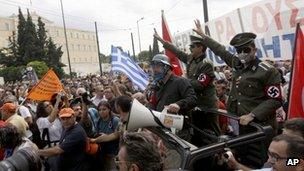German chancellor in 'exhausted' Athens
- Published

Protesters who turned up wearing Nazi uniforms in Athens were widely applauded
Angela Merkel came to Greece to offer support and sympathy but not much more.
Her visit revealed the deep weariness of the Greek people with austerity which many of them blame on the German chancellor.
The number of banners depicting Mrs Merkel as a Nazi were relatively few. Yet when a group of protesters arrived in Nazi uniforms to suggest the present government in Berlin was carrying out Nazi type-policies they were widely applauded.
Years of austerity have left many resentful of Germany.
There were probably tens of thousands of protesters on the streets. They were only contained by locking down a wide part of central Athens. Again, when masked youths began attacking the police barricades it was interesting to watch the number of older protesters who stood there clapping.
The Greek Prime Minister, Antonis Samaras, gave Mrs Merkel a big welcome. He saw the visit as a sign that Germany's attitude to Greece is changing. The visit was the most dramatic way of signalling that Germany wants Greece to stay in the euro.
Mr Samaras, who was once deeply mistrusted in Berlin, told Mrs Merkel that "the Greek people are bleeding at the moment, but they are determined to stay in the euro and to win the battle for competitiveness".
Mrs Merkel came with the message that the tough path of spending cuts will pay off. The people of Greece, she said, were "going through a difficult period, a lot is being asked of them and that's why I must stress how far they have travelled down this difficult road". She told them progress had been made.
The words were warm, but the message was that austerity must continue.
"We have to deal with problems that have been created over decades." More time would be needed. There was no hint of more money or of an easing of terms of the current bailout deal.
'Exhausted'
Over the next 10 days Greece must come up with a further 13bn euros of savings to qualify for the next tranche of funding. Without it, Greece runs out of money by the end of November.
When Mrs Merkel met the Greek president there was a moment of reality. He said, speaking on behalf of the Greek people: "We're exhausted."
And that is the conundrum that hangs over so much of the eurozone. The promise is that more belt tightening and structural reforms will bring prosperity later.
What is unclear is how much patience the people of these indebted countries have. Will they give their politicians time or in the end will this crisis be settled on the streets?
The Greek prime minister says his country is going through the equivalent of the Great Depression.
Yet even though the economy has declined 23%, in five years further savings are being planned. Debt to GDP next year will reach 182%.
Mrs Merkel said today "much of the path is already behind us". The reality of the Greek economy leaves that in doubt.